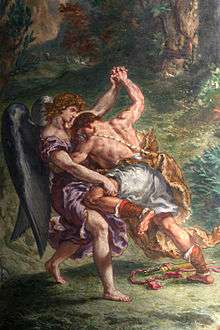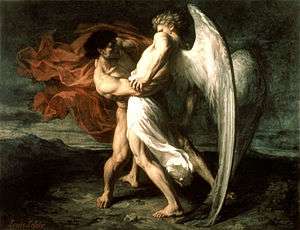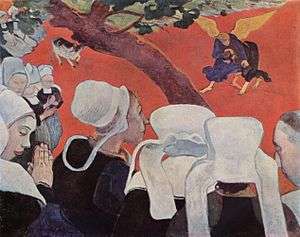Jacob wrestling with the angel

The account of Jacob wrestling with the angel is found in Genesis 32:22-32 and referenced elsewhere in Hosea 12:4. The account includes the renaming of Jacob as "Israel", literally "He who struggles with God."
Jacob spent the night alone on a riverside. There, a mysterious being—usually considered to be an angel—wrestled with Jacob, even striking him painfully in the hollow of his thigh. Jacob asks the being his name, and while he doesn't receive an answer, he names the place where they wrestled Peniel or Penuel.[Genesis 32:29-30] The event occurs during Jacob's journey back to Canaan.
Biblical text
The Masoretic text reads as follows:
The same night he arose and took his two wives, his two female servants, and his eleven children, and crossed the ford of the Jabbok. He took them and sent them across the stream, and everything else that he had. And Jacob was left alone. And a man wrestled with him until the breaking of the day. When the man saw that he did not prevail against Jacob, he touched his hip socket, and Jacob's hip was put out of joint as he wrestled with him. Then he said, “Let me go, for the day has broken.” But Jacob said, “I will not let you go unless you bless me.” And he said to him, “What is your name?” And he said, “Jacob.” Then he said, “Your name shall no longer be called Jacob, but Israel, for you have striven with God and with men, and have prevailed.” Then Jacob asked him, “Please tell me your name.” But he said, “Why is it that you ask my name?” And there he blessed him. So Jacob called the name of the place Peniel, saying, “For I have seen God face to face, and yet my life has been delivered.” The sun rose upon him as he passed Penuel, limping because of his hip. Therefore to this day the people of Israel do not eat the sinew of the thigh that is on the hip socket, because he touched the socket of Jacob's hip on the sinew of the thigh.
The account contains several plays on the meaning of Hebrew names — Peniel, Israel — as well as similarity to the root of Jacob's name (which sounds like the Hebrew for "heel") and its compound.[1] The limping of Jacob (Ya'aqob), may mirror the name of the river, Jabbok (Yabbok sounds like "crooked" river), and Nahmanides (Deut. 2:10 of Jeshurun) gives the etymology "one who walks crookedly" for the name Jacob.[2]
Talmud and Targums and Christian versions
Initially in 32:24 Jacob wrestles with "a man", but after the man's reply Jacob calls the place Peniel (Hebrew for Face of God), saying "For I have seen God face to face." Talmud, Targum, Syriac Peshitta, and Vulgate render "God" here "Angel".[3]
Interpretations
According to author Rosemary Ellen Guiley, "This dramatic scene has spurred much commentary from Judaic, Catholic, and Protestant theologians, biblical scholars, and literary critics. Does Jacob wrestle with God or with an angel?...There is no definitive answer, but the story has been rationalized, romanticized, treated as myth, and treated symbolically."[4] Maimonides believed that the incident was "a vision of prophecy." Both Martin Luther and John Calvin believed that Jacob had wrestled with God, although Calvin believed the event was only a vision.[5] Joseph Barker believed the Bible clearly showed that Jacob wrestled with God.[6] Among some Christian interpreters, this incident is thought to be a Christophany. J. Douglas MacMillan suggests that the angel with whom Jacob wrestles is a "pre-incarnation appearance of Christ in the form of a man."[7]
Muslim authors have interpreted the incident as Jacob wrestling with God and mention it as one of the ridiculous stories of the Bible.[8] Roland Boer describes the incident as falling into the category of "myth, or at least legend" and an example of "a bloodthirsty, vengeful God...outdone by cunning human beings keen to avoid his fury".[9] Whether Jacob was wrestling God or an angel, the story has been described as absurd.[10]
In arts
Visual arts
One of the oldest visual depictions is in the illustrated manuscript the Vienna Genesis.[11] Many artists have depicted the scene. In sculpture Jacob Wrestling with the Angel is the subject of a 1940 sculpture by Sir Jacob Epstein on display at the Tate Britain.[12] Paintings include:
-

Rembrandt (1659)
-

Eugène Delacroix (1861)
-

Eugène Delacroix (1861), (detail)
-

Alexander Louis Leloir (1865)
-

Léon Bonnat (1876)
-

"Jacob and the Angel" by Gustave Moreau (1878)
-

Paul Gauguin (1888), Vision after the Sermon showing the episode envisioned by Breton villagers.
In music
The Latin text of Genesis 32:30 'Vidi dominum facie ad faciem; et salva facta est anima mea' (I have seen the Lord face to face) was set for the third nocturn at Matins on the second Sunday of Lent and was a popular medieval telling of the story of Jacob's encounter with the angel. It is set as the tenor (upper voice) text of Machaut's multi-text-layered Motet No.15 Vidi dominum (I have seen the LORD) simultaneously with two secular French texts: "Faux semblant m'a decü" and "Amours qui ha le pouvoir."[13] Machaut musically contrasts God's blessing in the Latin text with the disappointments of secular love in the French texts.[14] Charles Wesley's hymn "Come, O Thou Traveller Unknown", often known as "Wrestling Jacob", is based on the passage which describes Jacob wrestling with an angel. It is traditionally sung to the tune of St Petersburg.[15]
In literature and theatre
The motif of "wrestling with the angels" occurs in several novels including Hermann Hesse's Demian (1919), Dodie Smith's I Capture the Castle (1948), Margaret Laurence's "The Stone Angel" (1964). In poetry in poems including Rainer Maria Rilke's "The Man Watching" (c.1920), and Emily Dickinson's poem "A little East of Jordan" (Fr145B, 1860). In theatre, wrestling with the angel is mentioned in Tony Kushner's play Angels in America (1990); the version depicted on-screen was the 1865 version by Alexander Louis Leloir. Gustave Dore's image is reenacted in Jean-Luc Godard's Passion by a film extra dressed as an angel and Jerzy Radziwiłowicz.[16] Also Maud Hart Lovelace's Betsy's Wedding (1955), Stephen King's novel It (1986), Sheila Heti's novel How Should A Person Be? (2012) and David Fennario's play Balconville (1979).
In popular culture
References in popular culture include mentions in U2's song "Bullet the Blue Sky" on The Joshua Tree (1987), Warren Zevon's song "My Ride's Here" on My Ride's Here (2002), Switchfoot's song "Twenty-Four" on The Beautiful Letdown (2003), Chance the Rapper's song Israel (Sparring) (2015), Angels in America (2003), House of Heroes' "In the Valley of the Dying Sun" on The End Is Not the End (2008). There is a point in the movie Here Comes the Boom (2012) where the lead character's MMA coach refers to this story as "Jacob wrestled with God all night with a dislocated hip and won his respect", and Suzanne Vega's Jacob and the Angel (2014).
See also
References
- ↑ A Dictionary of Biblical Tradition in English Literature — ed. David L. Jeffrey — 1992 Page 852 "WRESTLING JACOB The account of Jacob wrestling with the angel at the ford of the Jabbok River is replete with Hebrew puns (Gen. 32:24–32). Several of these relate to the root of Jacob's name, 'qb ("heel"), and its compound standing as a West Semitic diminutive of "The LORD will pursue" or "The LORD preserves"
- ↑ A Dictionary of Biblical Tradition in English Literature - ed. David L. Jeffrey - 1992 Page 852 "Jacob was forced to answer, Ya'aqob, perhaps mirroring the name of the river, Yabbok, but meaning "crooked" (Nahmanides, Deut. 2:10 of Jeshurun, gives this etymology for Jacob, "one who walks crookedly"; after the thigh wound delivered ..."
- ↑ Vetus Testamentum, International Organization of Old Testament Scholars, International Organization for the Study of the Old Testament 1960 -- Volume 10 - Page 277: "In Genesis it is a 'man' with whom Jacob wrestled. Later in the story this 'man' appears to be identified with God (Gen. xxxii 29, 31). Talmud, Targum, Syriac and Vulgate take 'God' here to be an angel."
- ↑ Rosemary Guiley (2004). The Encyclopedia of Angels. Infobase Publishing. p. 195. ISBN 9781438130026.
- ↑ Loades, Ann; McLain, Michael, eds. (1992). "Wrestling with the Angel: A Study in Historical and Literary Interpretation". Hermeneutics, the Bible and Literary Criticism (illustrated ed.). Springer. pp. 133–4. ISBN 9781349219865.
- ↑ Joseph Barker (1854). Seven Lectures on the Supernatural Origin & Divine Authority of the Bible. By J. Barker. Containing his reply to the Rev. Mr. Sergeant, etc. George Turner. p. 87.
- ↑ MacMillan, J. Douglas (1991). Wrestling with God: Lessons from the life of Jacob. Evangelical Press of Wales. p. 56.
- ↑ Sasan Tavassoli (2011). Christian Encounters with Iran: Engaging Muslim Thinkers After the Revolution. I.B.Tauris. p. 55. ISBN 9781845117610.
- ↑ Roland Boer (2007). Criticism of Heaven: On Marxism and Theology. BRILL. pp. 39, 41. ISBN 9789004161115.
- ↑ Stephen S. Mehler (2005). From Light Into Darkness: The Evolution of Religion in Ancient Egypt (illustrated ed.). Adventures Unlimited Press. pp. 131–2. ISBN 9781931882491.
- ↑ Horst Woldemar Janson, Anthony F. Janson History of Art: The Western Tradition 2004 "The Vienna Genesis ...(In the center foreground, for example, we see him wrestling with the angel, then receiving the angel's blessing.)" [full page illustration]
- ↑ .Tate.org.uk
- ↑ Anne Walters Robertson Guillaume De Machaut and Reims: Context and Meaning in His Musical ... 2002 - Page 163 "Drawn from the Genesis story of Jacob's wrestling match with the angel, Vidi dominum is a favorite phrase for ..."
- ↑ Iain Fenlon Early Music History: Studies in Medieval and Early Modern Music 2009 - Page 25 "The text of the tenor for Machaut's motet 15 comes from the third nocturn at Matins on the second Sunday of Lent. Its biblical provenance is Genesis 32: 30. Here Jacob, after having wrestled with the angel and received both a new name (Israel) and a divine blessing, exclaims: 'Vidi dominum facie ad faciem; et salva facta est anima mea'25 (I have seen the Lord face to face; ... treatment (motetus) are opposed to Jacob's wrestling with the angel that lead to his blessing and re-naming as Israel, ..."
- ↑ http://www.cyberhymnal.org/htm/c/o/comeotho.htm
- ↑ https://www.youtube.com/watch?v=aITlFnhE6oQ
Further reading
- Geller, Stephen A. (1982). "The Struggle at the Jabbok: the Uses of Enigma in a Biblical Narrative" (pdf). Journal of the Ancient Near Eastern Society (JANES). New Jork: Columbia University. 14: 37–60. Retrieved June 27, 2013. Also in: Geller, Stephen A. (1996). "2 - THE STRUGGLE AT THE JABBOK. The uses of enigma in biblical religion (pp. 9ff.)". Sacred Enigmas. Literary Religion in the Hebrew Bible. London: Routledge. ISBN 0-41512771-8. ISBN 978-0-41512-771-4.
[I]n the context of the wrestling bout, the name implies that Jacob won this supremacy, linked to that of God's, by a kind of theomachy. [...] By prevailing over God, he has won the name 'God rules'
(p. 22).
External links
| Wikimedia Commons has media related to Jacob Wrestling with the Angel. |